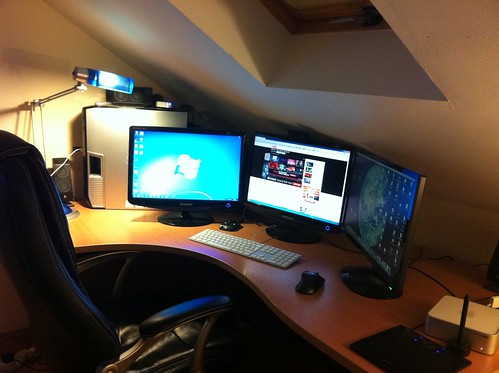
Do you know how to properly claim your home office as an expense?
In order to deduct expenses, the workspace must either be:
-
the place where the individual principally (more than 50% of the time) performs administration or employment duties, or
-
used on a regular and continuous basis, for meeting customers or other persons in the ordinary course of performing the office or employment duties.
If you meet the requirements of either description above, you are eligible to deduct your workspace related expenses.
However, the following rules apply:
- Your claim cannot exceed the annual gross income that you generated from your office or employment
- Your office or employment expenses cannot create or increase your annual loss for income tax purposes.
- If the expenses related to a workspace cannot be deducted in a taxation year, the expenses will be carried forward to the following year. In the case that you are an employee who works from home, your expenses carry forward so long as you are reporting income from the same employer.
- Regardless of whether you own or rent your home, your work space expenses are considered a reasonable portion of expenses you pay for the maintenance of your home. The cost of fuel, electricity, light bulbs, cleaning materials, and minor repairs can be claimed.
- If the workspace is part of a rented home, a reasonable proportion of the rent is otherwise deductible. However, no deduction can be made for the rental value of the workspace area if you own your home.
- Consequently, if you are not a commission sales employee expenses on account of capital cost allowance, taxes, insurance, and mortgage interest cannot be deducted.
- If you are a commission sales employee and are entitled to claim expenses, a reasonable proportion of the taxes and insurance paid on your owned home. However, no mortgage interest or capital cost allowance can be deducted.
Calculating the percentage you can claim
1. Determine what percentage of your homes total floor space is taken up by your home office.
Eg. Client A has an office that takes up 10% of the total floor space of their home.
2. Determine what percentage of your time spent in your home office is for employment purposes and for personal purposes
Eg. Client A is using their office for employment purposes 60% of the time while the remaining 40% of the time it is used for personal purposes.
3. Use these percentages to calculate the percentage of your total home expenses that you can deduct.
Eg. In the case presented 60% of Client A’s home maintenance costs are deductible (60% (time used for employment purposes) of 10% (size of the space in relation to the house))
What can you consider supplies?
The word “supplies”, is limited to materials that are used up directly in the performance of the duties of the employment.
They include:
- long-distance telephone calls and cellular telephone airtime that reasonably relate to the earning of employment income and various stationery items.
Supplies do not include:
- the monthly basic service charge for a telephone line amounts paid to connect or license a cellular telephone, special clothing customarily worn or required to be worn by employees in the performance of their duties, and any types of tools which generally fall into the category of equipment.
Sole Proprietors:
You can deduct expenses for the business use of a workspace in your home, as long as you meet one of the following conditions:
-
it is your principal place of business; or
-
you use the space only to earn your business income, and you use it on a regular and ongoing basis to meet your clients, customers, or patients.
You can deduct part of your maintenance costs such as heat, home insurance, electricity, and cleaning materials. You can also deduct part of your property taxes, mortgage interest, and CCA.
To calculate the part you can deduct, use a reasonable basis such as the area of the work space divided by the total area of your home.
If you rent your home, you can deduct part of the rent and any expenses you incur that relate to the workspace.
The amount you can deduct for business use of home expenses cannot be more than your net income from the business before you deduct these expenses. In other words, you cannot use these expenses to increase or create a business loss.
Salaried employees:
You can deduct expenses you paid for the employment use of a workspace in your home, as long as you had to pay for them under your contract of employment.
These expenses must be used directly in your work and your employer has not reimbursed and will not reimburse you. Also, you must meet one of the following conditions:
-
The workspace is where you mainly (more than 50% of the time) do your work.
-
You use the workspace only to earn your employment income. You also have to use it on a regular and continuous basis for meeting clients or customers.
You can deduct the part of your costs that relates to your workspace, such as the cost of electricity, heating, and maintenance. You cannot deduct mortgage interest, property taxes, home insurance, or capital cost allowance.
If your office space is in a rented house or apartment where you live, deduct the percentage of the rent as well as any maintenance costs you paid that relates to the workspace.
Commission employees:
You can deduct expenses you paid for the employment use of a workspace in your home, as long as you meet one of the following conditions:
-
The workspace is where you mainly (more than 50% of the time) do your work.
-
You use the workspace only to earn your employment income. You also have to use it on a regular and continuous basis for meeting clients and customers.
You can deduct the part of your costs that relates to your workspace, such as the cost of electricity, heating, maintenance, property taxes, and home insurance. However, you cannot deduct mortgage interest or capital cost allowance.
To calculate the percentage of workspace expenses you can deduct, use a reasonable basis, such as the area of the work space divided by the total finished area (including hallways, bathrooms, kitchens, etc.).
For maintenance costs, it may not be appropriate to use a percentage of these costs. For example, if the expenses you paid (such as cleaning materials or paint) were to maintain a part of the house that was not used as a workspace, then you cannot deduct any part of them. Alternatively, if the expenses you paid were to maintain the workspace only, then you may be able to deduct all or most of them.
If your office space is in a rented house or apartment where you live, deduct the percentage of the rent and any maintenance costs you paid that relate to the workspace.


